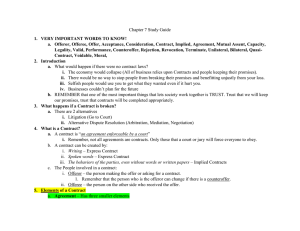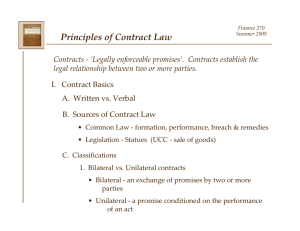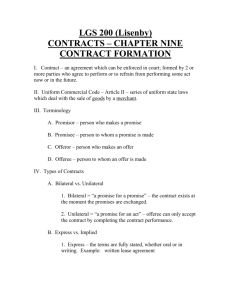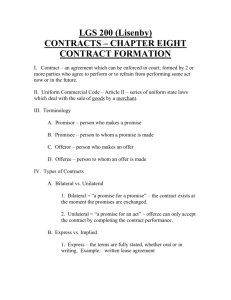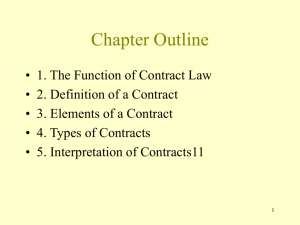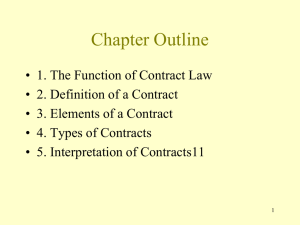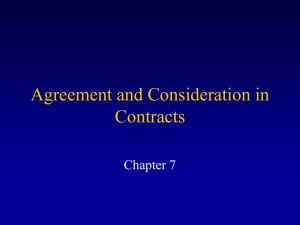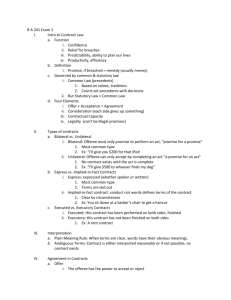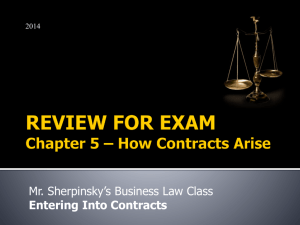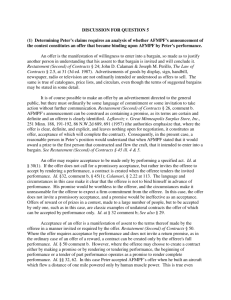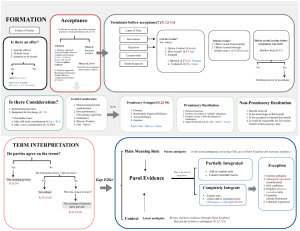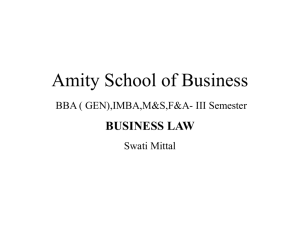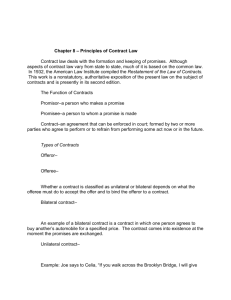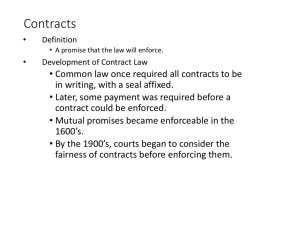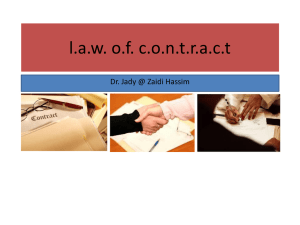Contract Basics
advertisement
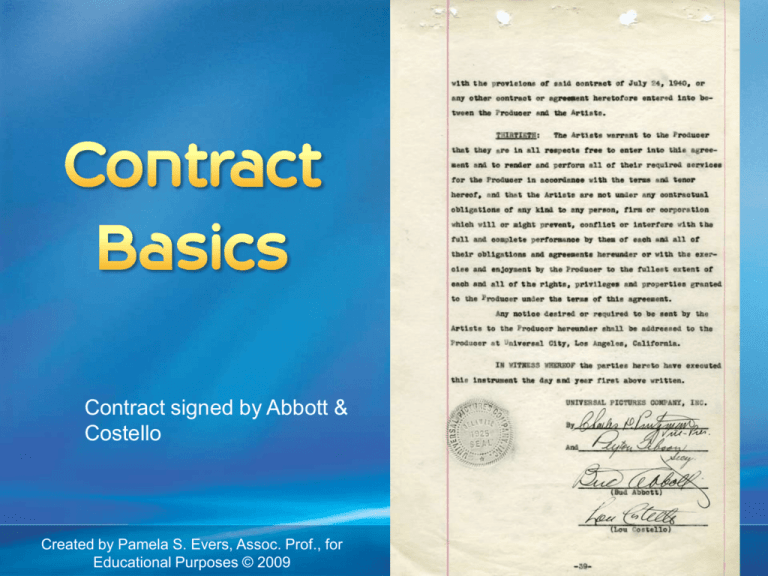
Contract signed by Abbott & Costello Created by Pamela S. Evers, Assoc. Prof., for Educational Purposes © 2009 Contract: legally binding agreement (promise or set of promises) creating an obligation (duty) to perform for the breach of which the law gives a remedy Express: agreement of parties manifested by written or oral words Implied: agreement not shown by words, but by acts and conduct of parties Difference between express & implied contracts relates to manner of proving the existence of the contract, not the effect Some terms are implied by law based upon the context of words that are otherwise vague, or by acts and conduct of the parties, or according to industry practice. “sack” of flour means one thing to a consumer and another to restaurants CLPOAGAC = CONTRACT Capacity & Lawful Purpose Offer & Acceptance Genuine Assent & Consideration Clearly, Live People On A Gate Are Crazy Cute Little Penguins Often Attack Giant Arctic Cats Agreement arises when a person (offeror) makes an offer and the person to whom the offer is made (offeree) accepts. Offer and acceptance required to form agreement Parties to a contract must have intent to enter binding agreement Valid contract: agreement binding and enforceable Voidable contract: agreement otherwise binding, but because of circumstances surrounding execution or lack of capacity, may be rejected at option of one party Void contract: agreement without legal effect because prohibited by law The ability to understand that a contract is being made and the general meaning of the contract Presumption: everyone has capacity Only the party without capacity can avoid a contract by proving “status incapacity” (minor or mental incompetent by law) or “factual incapacity” (e.g., intoxication) A minor can enter into any contract, but a contract a minor enters into is voidable at the option of that minor (disaffirmed) or may be “ratified” (affirmed) A contract can be disaffirmed (expressly or impliedly) at any time during minority or for reasonable period after minor is of age Parents not liable for minor’s contracts unless statute states otherwise Intoxicated persons may lack contractual capacity at time contract is being made Contract either voidable or valid Courts look at objective indications to determine if contract is voidable Agreement must not call for performance of any act that is criminal, tortious, or otherwise opposed to public policy Good faith and fairness: parties must act in good faith to perform unequal bargaining power may be remedied Hiring “Hitman” isn’t legal Offer and resulting contract must be definite and certain and communicated to offeree Cannot be vague re: major points “I’ll paint your house until I’m tired” is vague, but “I’ll finish painting your house in three days” is definite “I’ll send you a few cases of the product soon” is vague, but “I’ll send you five cases of Product XYZ by Friday, Oct. 9” is definite An invitation to negotiate (e.g., seller sending out flyers, catalogs listing prices, or “for sale” ad in newspaper or yard ) is not an offer Sales puffery is not an offer: “HARRIER JET FIGHTER 7,000,000 PEPSI POINTS.” Revocation: if revoked & communicated to offeree before offer accepted Counteroffer: any change to offer as part of attempt to accept offer is a counteroffer that rejects original offer Rejection Lapse of time: offer expires Death or disability of either party Subsequent illegality Acceptance must be by clear expression by offeree of intent to be bound by terms of offer Offeror may specify manner of acceptance Only offeree may accept offer Silence may be acceptance Sending unrequested merchandise does not obligate payment If offer calls for performance, then performance is the acceptance Contract may be unenforceable if the parties have not genuinely assented to its terms because of : Misrepresentation Mistake Undue Influence Duress This would constitute duress! Negligent misrepresentation: may affect contract depending on the state and the circumstances Intentional misrepresentation (fraud): intent to deceive and reliance required contract voidable by innocent party misrepresentation of law, future facts, and statements of opinion aren’t fraud, unless person is an expert Express or implied (including silence) Consideration is legal value given in return for a promise or performance generally, money or goods constitute consideration consideration can be a covenant not to sue or doing something not otherwise required to do Contract between Henry Ford & C. Harold Wills A court will not question the fairness of the bargain if legally sufficient Law generally does not protect a person for entering into an unwise contract A party may be discharged (released) from a valid contract by: Full performance or material breach by the party A condition occurring or not occurring Agreement of the parties (including agreeing to new or different contract) Operation of law (e.g., fraud, impossibility or impracticability of performance) Breach of contract is the failure to act or perform in manner called for by the contract Breach leads to Remedies of: Monetary damages Rescission or Restitution Specific Performance Reformation Recovery Based on Quasi Contract To be enforceable, the following contracts must be in writing and signed: Contracts involving interest in land Contracts subject to “One year rule” Collateral or Secondary Contracts Promise made in consideration of marriage Contracts for the sale of goods priced at $500 or more If the court finds that the parties intended their written contract to be a complete and final embodiment of their agreement, a party cannot introduce evidence of any oral agreement or promise made before or at the time the contract was created Court may apply doctrine of promissory estoppel if one party relies upon promise of other party to his/her detriment (detrimental reliance), but there’s no “contract” Court may force promisor to fulfill promise or pay damages E.g., XX Corp. tells Jack he has a job if he arrives on Oct. 22. Upon reasonable belief of a job offer, Jack quits his job, moves, and shows up on the 22nd. XX denies job offer, but court will hold XX liable for Jack’s damages for detrimental reliance. An obligation imposed by law (i.e., “implied by law”) to prevent unjust enrichment of one party in certain circumstances Example 1 (quantum meruit or value of labor): Plumber performs work thinking that work is justified under the contract. Other party, who receives benefit of work, denies payment claiming work unjustified. Example 2 (reasonable price): Minor buys car and wrecks it. Contract void by law, but minor (or parents) must pay damages based on reasonable value of benefit conferred on minor
